This update looks at the provisions of the Draft IP Policy Phase 1 2017 relating to parallel import and state 'walk-in' rights for access to affordable medicines (for further details please see "Draft IP Policy Phase 1: access to medicines and compulsory licensing").
A number of existing legal mechanisms theoretically promote access to medicines, including voluntary licensing. The Medicines Patent Pool (MPP) has been used extensively in South Africa in respect of licensing patented drugs and manufacturing for access to medicines for HIV, viral hepatitis C and tuberculosis. The licensing of drugs for other diseases, including cancer, is not presently provided for through the MPP, but this is an avenue that could be further explored in order to facilitate affordable access to medicines.
The draft policy refers to the Doha Declaration, of which South Africa is a member, which provides that the Agreement on Trade-Related Aspects of Intellectual Property Rights (TRIPs) can be interpreted by members in order to promote access to medicines for all, including through the use of government 'walk-in' rights in a national emergency, which include epidemics like HIV/AIDS, tuberculosis and malaria.
The South African Patents Act contains provisions for government 'walk-in' rights in relation to affordable access to medicines. A minister of state can use an invention for public purposes on agreed-upon conditions, or – if there is no agreement – on conditions determined by the commissioner of patents on application by the minister and after hearing the patentee. There are no grounds stipulated, except that use should be for public purposes.
However, the draft policy avers that this section has never been used by the state because of the prior negotiation requirement, and because it requires expensive litigation proceedings where there is no agreement between the parties. The draft policy suggests that since TRIPs does not impose prior negotiation requirements, the government should implement legislative and other measures in order to simplify state 'walk-in' rights for affordable medicines. Any such measures must also be in line with the legal requirements for procedural fairness, such as those provided for in the Expropriation Act.
The Medicines Act provides for the parallel import of medicines and is administered by the Department of Health. This mechanism has never been used, possibly because of the complex requirements with which applicants must comply. Therefore, the draft policy requires that local legislation be amended in order to facilitate the parallel import of medicines, and has committed to engage with all stakeholders in this regard. The South African government has also ratified the Paragraph 6 system for the amendment of TRIPs in order to facilitate access to medicines in countries that lack pharmaceutical manufacturing capacity. Although this mechanism has been the subject of various criticisms, the draft policy provides that the government will engage stakeholders to ensure that implementation is as straightforward as possible.
Although there are complex issues surrounding access to affordable medicines, the inclusive process that the government has used in the implementation of the new policy is encouraging.
For further information on this topic please contact Joanne van Harmelen at ENSafrica by telephone (+27 21 410 2500) or email ([email protected]). The ENSafrica website can be accessed at www.ensafrica.com.
This article was first published by the International Law Office, a premium online legal update service for major companies and law firms worldwide. Register for a free subscription.



